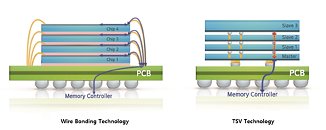- Joined
- Oct 9, 2007
- Messages
- 47,384 (7.52/day)
- Location
- Hyderabad, India
| System Name | RBMK-1000 |
|---|---|
| Processor | AMD Ryzen 7 5700G |
| Motherboard | ASUS ROG Strix B450-E Gaming |
| Cooling | DeepCool Gammax L240 V2 |
| Memory | 2x 8GB G.Skill Sniper X |
| Video Card(s) | Palit GeForce RTX 2080 SUPER GameRock |
| Storage | Western Digital Black NVMe 512GB |
| Display(s) | BenQ 1440p 60 Hz 27-inch |
| Case | Corsair Carbide 100R |
| Audio Device(s) | ASUS SupremeFX S1220A |
| Power Supply | Cooler Master MWE Gold 650W |
| Mouse | ASUS ROG Strix Impact |
| Keyboard | Gamdias Hermes E2 |
| Software | Windows 11 Pro |
Samsung Electronics Co., Ltd., a world leader in advanced semiconductor technology, today announced that it has developed the industry's first 12-layer 3D-TSV (Through Silicon Via) technology. Samsung's new innovation is considered one of the most challenging packaging technologies for mass production of high-performance chips, as it requires pinpoint accuracy to vertically interconnect 12 DRAM chips through a three-dimensional configuration of more than 60,000 TSV holes, each of which is one-twentieth the thickness of a single strand of human hair.
The thickness of the package (720 µm) remains the same as current 8-layer High Bandwidth Memory-2 (HBM2) products, which is a substantial advancement in component design. This will help customers release next-generation, high-capacity products with higher performance capacity without having to change their system configuration designs. In addition, the 3D packaging technology also features a shorter data transmission time between chips than the currently existing wire bonding technology, resulting in significantly faster speed and lower power consumption.

"Packaging technology that secures all of the intricacies of ultra-performance memory is becoming tremendously important, with the wide variety of new-age applications, such as artificial intelligence (AI) and High Power Computing (HPC)," said Hong-Joo Baek, executive vice president of TSP (Test & System Package) at Samsung Electronics.
"As Moore's law scaling reaches its limit, the role of 3D-TSV technology is expected to become even more critical. We want to be at the forefront of this state-of-the-art chip packaging technology."
Relying on its 12-layer 3D-TSV technology, Samsung will offer the highest DRAM performance for applications that are data-intensive and extremely high-speed.
Also, by increasing the number of stacked layers from eight to 12, Samsung will soon be able to mass produce 24-gigabyte (GB)* High Bandwidth Memory, which provides three times the capacity of 8GB high bandwidth memory on the market today.
Samsung will be able to meet the rapidly growing market demand for high-capacity HBM solutions with its cutting-edge 12-layer 3D TSV technology and it hopes to solidify its leadership in the premium semiconductor market.
View at TechPowerUp Main Site
The thickness of the package (720 µm) remains the same as current 8-layer High Bandwidth Memory-2 (HBM2) products, which is a substantial advancement in component design. This will help customers release next-generation, high-capacity products with higher performance capacity without having to change their system configuration designs. In addition, the 3D packaging technology also features a shorter data transmission time between chips than the currently existing wire bonding technology, resulting in significantly faster speed and lower power consumption.

"Packaging technology that secures all of the intricacies of ultra-performance memory is becoming tremendously important, with the wide variety of new-age applications, such as artificial intelligence (AI) and High Power Computing (HPC)," said Hong-Joo Baek, executive vice president of TSP (Test & System Package) at Samsung Electronics.
"As Moore's law scaling reaches its limit, the role of 3D-TSV technology is expected to become even more critical. We want to be at the forefront of this state-of-the-art chip packaging technology."
Relying on its 12-layer 3D-TSV technology, Samsung will offer the highest DRAM performance for applications that are data-intensive and extremely high-speed.
Also, by increasing the number of stacked layers from eight to 12, Samsung will soon be able to mass produce 24-gigabyte (GB)* High Bandwidth Memory, which provides three times the capacity of 8GB high bandwidth memory on the market today.
Samsung will be able to meet the rapidly growing market demand for high-capacity HBM solutions with its cutting-edge 12-layer 3D TSV technology and it hopes to solidify its leadership in the premium semiconductor market.
View at TechPowerUp Main Site



